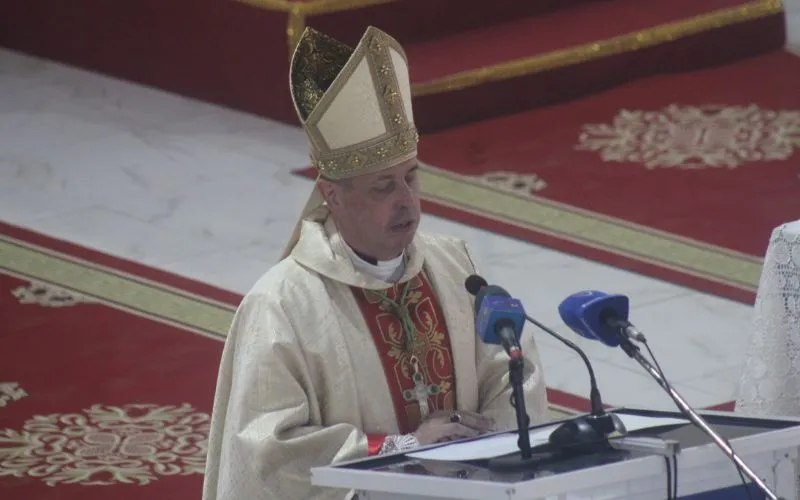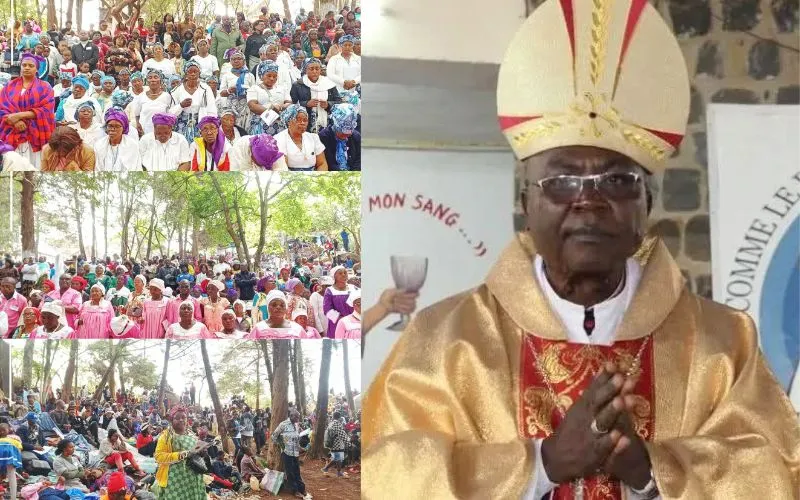The Apostolic Nuncio in Cameroon since his appointment in August 2023 reminded the people of God about the Gospel’s call to embody love and unity as the path to true peace.
“Jesus, the Prince of Peace, proposes attitudes of love and unity that contrast sharply with the world’s violent methods. Artisans of hope and peace are filled with love that drives out fear,” he said in his homily at the Divine Mercy Co-Cathedral of the Buea Diocese.
Archbishop Bettencourt lauded the people of Buea Diocese for their spirit of reconciliation, saying, “Here in Buea, love has proven a uniting force that breaks down man-made walls.”
He advocated for unity as the distinctive mark for families, institutions, and nations, and emphasized the need to foster peace as “an individual and collective mission” built on mutual commitment.
The member of the Clergy of Canada’s Ottawa-Cornwall Catholic Archdiocese called on his brother Bishops to lead the faithful as “pastors of hope, peace, and grace.” He thanked them for their tireless work, which he described as a “source of hope for many.”
(Story continues below)
“May our most blessed Heavenly Mother, Queen of Peace, Patron of Cameroon, intercede for us and the divine mercy of Jesus bless you all,” Archbishop Bettencourt implored in his January 11 homily.
Cameroon’s Catholic Bishops convened in the Catholic Diocese of Buea from January 4-11 to explore ways of putting into practice the deliberations of the XVI Ordinary General Assembly of the Synod of Bishops, the Synod on Synodality, which Pope Francis officially inaugurated in 2021.
The 48th Annual Seminar of the NECC members was organized under the theme, “Living Synodality in our Local Church”. The next Seminar is to take place in the Catholic Diocese of Kumba in January 2026.
In his speech during the closing Mass of the Annual Seminar, NECC President, Archbishop Andrew Nkea Fuanya of Cameroon’s Bamenda Archdiocese, thanked Catholics in Buea for their hospitality.
“We all began our work with our hearts open to the word of God so that He may help us to discern what the Spirit says to the Church in Cameroon today and particularly what the Spirit says to our National Episcopal Conference today,” Archbishop Nkea said.
Reflecting on theme of the 2025 NECC Annual Seminar, he said, “We have come to understand the need for a conversion of our pastoral attitude in order to be signs of communion and participation for an effective mission in our particular churches and within our Bishops' Conference.”
“Our vocation as Church is to continue to work together in the bond of love and unity so that the world may believe in the one who sent us,” he said, and continued, “We have discovered the need to walk together under the guidance of the Holy Spirit in order to be in our particular churches as disciples and missionaries following Jesus Christ.”
“To be a synodal Church that prays, works, and walks together means that we, the pastors and our particular churches, are also listening to our brothers and sisters, the Priests and the Deacons, the Consecrated Persons and the Laity,” the Cameroonian Catholic Archbishop said.
He added, “We have also decided to share the fruits of the final document of the synod in order to welcome the joys and sorrows and the expectations of all the people of God. All this will allow us to answer the question we have been asking ourselves for the past few years. Which Church, which Episcopal Conference does God want for us in Cameroon?”
“As Pope Francis said, a few years ago, the world in which we live and which we are called to love and serve, even in its contradictions, demands from the Church the strengthening of synergies in all areas of its mission,” Archbishop Nkea said.
He continued, “This is precisely the path of synodality that God expects from the Church of the third millennium. We must not be afraid to respond to this call, which corresponds so well to our African cultures and traditions.”
Recalling the deliberations during the weeklong Annual Seminar, Archbishop expressed his awareness of the challenges the people of God in Cameroon grapple with.
He said, “We have held a seminar bearing in mind the very difficult social and economic context of our country and the wounds and scandalous inequalities could not but resound in our ears, making us hear the cry of despair of so many Cameroonians, who can no longer make both ends meet.”
“These cries coming from the suffering of our fellow citizens, who really struggle for their living, gave to our work a particular gravity. We could not but pray for all the victims of violence, hunger, and corruption,” the Catholic Church leader, who started his Episcopal Ministry in August 2013 as the Coadjutor Bishop of Cameroon’s Mamfe Diocese said.
“We have in a special way prayed for our youth, whose exodus from greener pastures gives a clear indication that there may be no future for them in our country if we don't change our methods,” he said.
For the NECC President, “Synodality also means solidarity. As Bishops of Cameroon, we express our proximity with all those who are suffering.”
Jude Atemanke is a Cameroonian journalist with a passion for Catholic Church communication. He holds a Bachelor’s Degree in Journalism and Mass Communication from the University of Buea in Cameroon. Currently, Jude serves as a journalist for ACI Africa.





